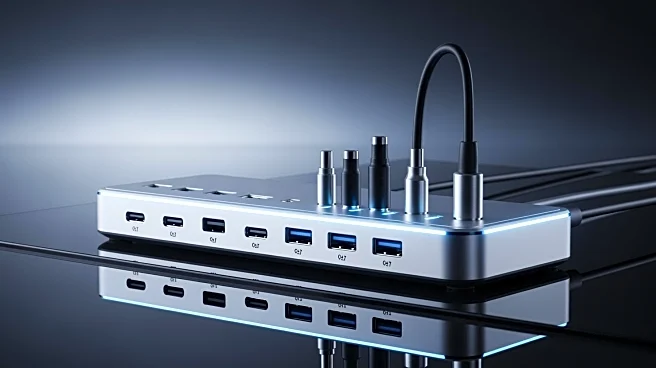What's Happening?
Health savings accounts (HSAs) and flexible spending accounts (FSAs) are increasingly covering a range of wellness devices, transforming how employees view their benefits. Traditionally associated with medical expenses, these accounts now include items like massage guns, smart rings, and heart rate monitors. The Oura Ring, a popular smart ring, is now eligible for purchase or reimbursement through FSA and HSA funds. Other devices such as Garmin's Index BPM Smart Blood Pressure Monitor and Garmin HRM-Pro Plus Chest Strap Heart Rate Monitor are also covered. This shift reflects a broader trend towards integrating wellness technology into healthcare benefits, allowing consumers to use pre-tax dollars for these purchases. However, eligibility often requires a medical necessity, necessitating a doctor's note for certain items.
Why It's Important?
The expansion of HSA and FSA coverage to include wellness devices signifies a shift in healthcare benefits, emphasizing preventive care and personal wellness. This change could lead to increased consumer spending on health technology, benefiting manufacturers of these devices. It also highlights a growing recognition of the role of technology in managing health, potentially improving public health outcomes by encouraging proactive health monitoring. Employers may see enhanced employee satisfaction and retention as benefits become more comprehensive. However, the requirement for medical necessity could limit access for some consumers, underscoring the need for clear guidelines and communication from providers.
What's Next?
As HSAs and FSAs continue to evolve, more wellness devices may become eligible for coverage, further integrating technology into healthcare. Providers and employers will likely need to update their policies and educate consumers on eligibility criteria. The trend may prompt manufacturers to innovate and expand their product lines to meet the growing demand for covered wellness technology. Additionally, healthcare professionals might see an increase in requests for medical necessity documentation, impacting their practice management. Stakeholders will need to monitor regulatory changes and consumer feedback to ensure the effective implementation of these expanded benefits.
Beyond the Headlines
The inclusion of wellness devices in HSA and FSA coverage raises ethical and legal questions about access to healthcare technology. It may exacerbate disparities if only those with specific medical conditions can access these benefits, potentially widening the gap between different socioeconomic groups. Furthermore, the integration of AI and advanced functionalities in wearables could lead to privacy concerns, as personal health data becomes more accessible to third parties. Long-term, this trend could influence cultural attitudes towards health management, promoting a more tech-driven approach to personal wellness.









